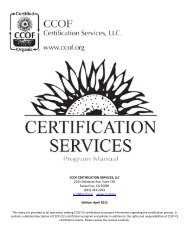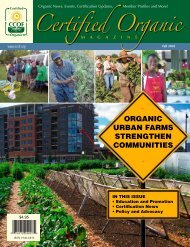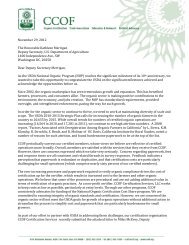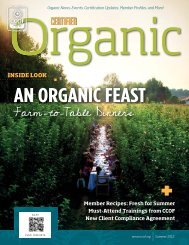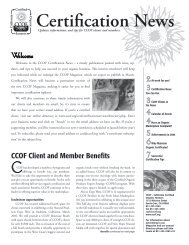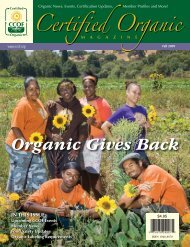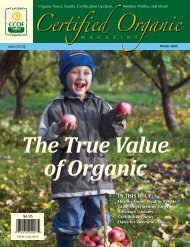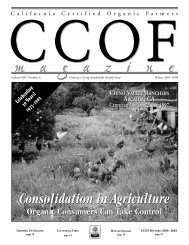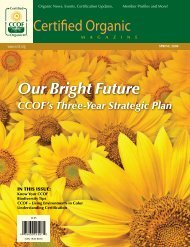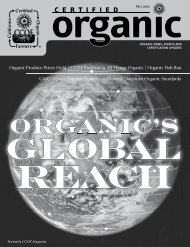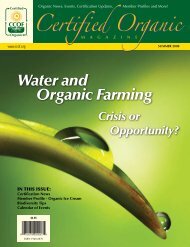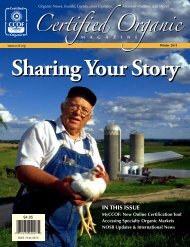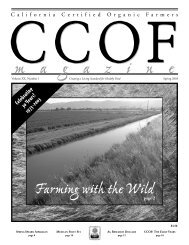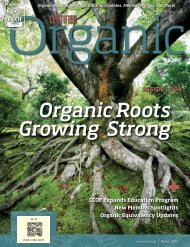Going Organic: Training New Growers - CCOF
Going Organic: Training New Growers - CCOF
Going Organic: Training New Growers - CCOF
Create successful ePaper yourself
Turn your PDF publications into a flip-book with our unique Google optimized e-Paper software.
<strong>Going</strong> <strong>Organic</strong> continued from page 13<br />
educational institutions, and policy makers.<br />
Guided by a Management Team<br />
A Management Team representing chapter representatives,<br />
the Foundation, <strong>CCOF</strong>, Inc., UCCE, UC Davis, the San Francisco<br />
Estuary Institute (SFEI),<br />
and the Water Board will guide<br />
development and implementation<br />
for the next three years. At<br />
the same time, individual chapter<br />
leaders will help track the<br />
mentor and trainee activities<br />
and schedule meetings for the<br />
benefit of the project participants<br />
as well as other interested<br />
parties. Opportunities are<br />
available for <strong>CCOF</strong> growers to<br />
become chapter leaders as part<br />
of this project.<br />
Potential Barriers. Do you expect the following potential<br />
barriers to organic farming to be a problem for you?<br />
1=Not at all, 5=Very much<br />
<strong>Going</strong> <strong>Organic</strong> Kick-Off<br />
Meetings<br />
The program has already<br />
gotten off to a fast start by<br />
hosting or contributing to four<br />
meetings that have featured<br />
the <strong>Going</strong> <strong>Organic</strong> program. The meetings include talks by<br />
organic farmers on cover crops, compost, water quality, USDA<br />
Natural Resource Conservation Service (NRCS), Environmental<br />
Quality Incentives Program (EQIP) cost-share funding,<br />
and much more. Sessions have been held in Livingston, Chico,<br />
Placerville, and Woodland to support each of the chapters.<br />
Partners and sponsors include UCCE, CSU Chico, the East<br />
Merced Resource Conservation District, and Appropriate<br />
Technology Transfer for Rural Areas (ATTRA). More <strong>Going</strong><br />
<strong>Organic</strong> kick-off meetings are planned to solicit additional<br />
project trainees and mentors. Local chapter meetings will continue<br />
the information exchange on a one-on-one basis.<br />
<strong>Going</strong> <strong>Organic</strong> program is seeking applications for both organic farmer<br />
mentors and non-organic farmer trainees who wish to change some<br />
Seeking Mentors and Trainees<br />
The <strong>Going</strong> <strong>Organic</strong> program is seeking applications<br />
for both organic farmer mentors and non-organic farmer<br />
trainees who wish to convert some or all of their acreage to<br />
organic production. Interested growers should contact Fred<br />
Thomas (contact information below) and visit www.ccof.org<br />
for additional information. Farmers new to organic production<br />
systems will be asked to visit their mentor’s farm, and<br />
mentors will visit the trainees’ farming operations. Recognizing<br />
that many organic farmers use regular or occasional<br />
tillage for weed control, each of the trainee farms will be<br />
assessed for erosion control and, if indicated, a remediation<br />
plan will be implemented.<br />
Water Testing Program<br />
SFEI will test water from public access points on three<br />
Ranking of Issue<br />
by Non-<strong>Organic</strong><br />
Farmers<br />
Ranking of Issue<br />
by Experienced<br />
<strong>Organic</strong> Farmers<br />
Average Rating<br />
by Non-<strong>Organic</strong><br />
Farmers<br />
Complexity of organic farm management systems 1 5.5 4.00 2.67<br />
Lower yields than conventional farming 2 4 3.64 2.86<br />
Higher labor requirements of organic farming 3 1 3.45 3.40<br />
Difficulty of keeping records required for organic certification 4.5 8.5 3.18 2.47<br />
Lack of published technical information 4.5 2 3.18 3.07<br />
Insufficient price premiums for organic products 6.5 7 3.00 2.57<br />
Lack of direct technical support 6.5 3 3.00 2.93<br />
Lack of support in completing certification paperwork 8 11 2.82 2.00<br />
Lack of government subsidies for organic farming 9 10 2.60 2.36<br />
Lack of knowledge of organic marketing approaches 10 8.5 2.55 2.47<br />
Insufficient consumer interest in organic products 11 5.5 2.36 2.67<br />
Peer pressure to farm conventionally 12 12 1.64 1.93<br />
Table 1. Comparison of organic and non-organic farmers’ perceptions regarding barriers to organic farming.<br />
or all of their acreage to organic production.<br />
Average Rating<br />
by Experienced<br />
<strong>Organic</strong> Farmers<br />
watersheds representing drainage that is primarily organic,<br />
about half organic, and primarily not organic. Currently SFEI<br />
plans to focus the runoff study within the Sacramento Valley<br />
where higher rainfall and heavier soils will contribute to a<br />
scientifically valid study. The testing, conducted on a regular<br />
schedule over two years, will yield valuable insights into the<br />
beneficial uses associated with organic production systems.<br />
The results will be entered into the Surface Water Ambient<br />
Monitoring Program (SWAMP) database to assist decision<br />
makers who formulate policy regarding organic production<br />
systems under the Central Valley Agricultural Discharge<br />
Waiver program.<br />
What Are the Barriers to <strong>Organic</strong> Transition?<br />
Part of the 2003 <strong>Going</strong> <strong>Organic</strong> pilot program included<br />
an assessment of the barriers farmers might face in going organic.<br />
They include:<br />
• Lack of familiarity with basic principles of organic<br />
farming<br />
• Lack of technical assistance<br />
• Insufficient marketing skills<br />
• Lack of peer support<br />
At each <strong>Going</strong> <strong>Organic</strong> workshop in 2004, participants<br />
completed questionnaires describing their level of understanding<br />
of different topics. Those growers entering the<br />
mentoring program were also asked to complete a second<br />
questionnaire rating and describing their views of these and<br />
other barriers to organic conversion.<br />
The survey asked organic and non-organic farmers to<br />
rate their perceptions of potential barriers to organic farming.<br />
(See Table 1) The non-organic farmers rated seven of 12<br />
20 Certified <strong>Organic</strong> Winter 2006



